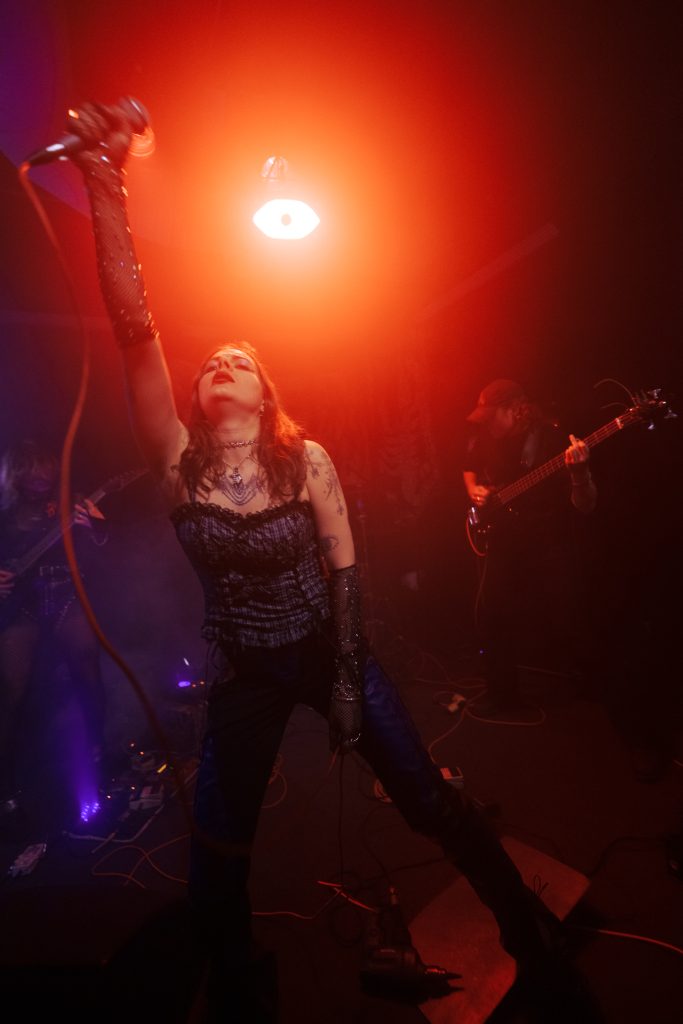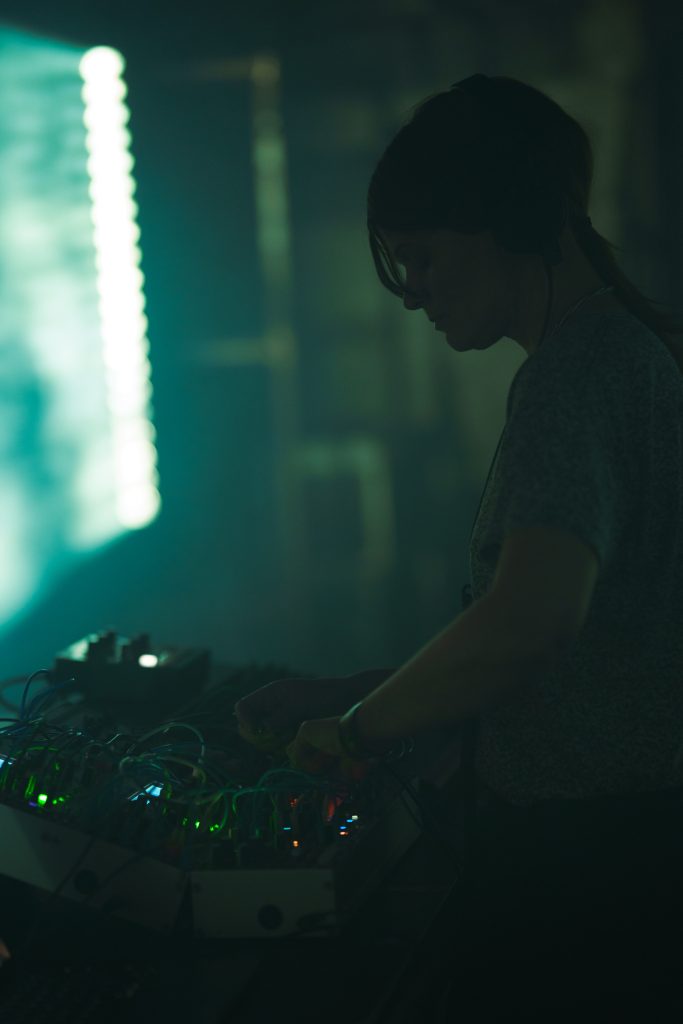The Swedish festival Intonal recently celebrated its 10th edition in Malmö, in and around the venue Inkonst who are also the organisers of the annual event. I can’t count myself as one of the lucky few that have attended all of them, but at least six or seven.
They’ve had a habit of publishing a manifesto to go with the festival each year and I think that’s important because: what does it mean to be a festival for experimental music and art? Especially when there are dozens of other likeminded festivals (perhaps not so much in Northern Europe, but definitely on the continent) and it can be quite hard to decide where to spend the tiny budget you may be sitting on.
It’s essential to explain to the audience why you exist and what you want to achieve as a festival. This year, in 2025, Intonal published a fanzine (created by Stacey de Voe) with contributions from a handful of artists who have been a part of the festival over the years like Cucina Povera and Zesknel. Sometimes you have to look back in order for some kind of horizon to form at the opposite end.
What I loved most about the publication is a cut-up amalgamation of all of the past manifestos – to create a new one. To quote:
The tone has grown both increasingly defiant and humbler. How can we either lament or celebrate our scene when faced with real-world atrocities like the ongoing and extreme injustice around the world, the rise of neo-fascism, and the ever-increasing consequences of climate inaction?
This is something I guess we all think about in our practices. And the answer that is proposed is curiosity. As a way to break the boredom and the inertia. That is something Intonal definitely achieved, if you ask me. But what are the memories I will bring with me? Here are some of the highlights from 2025.
Tarta Relena

I was completely awestruck the first time I saw Tarta Relena, which was also a place I’d been led to out of curiosity. Without having heard their music before, their live show tends to leave listeners gobsmacked. That time, I saw them play in a huge church. Another time, I saw them play at Inkonst and I didn’t have the same feeling at all. That show was sadly not packed with people, so it was great to see them return to the venue, and as they said themselves ”it’s nice to see more people here than last time”.
They also brought a brand new show for the audience, based on their new album Es pregunta from last year. In matching burgundy outfits and drum pads clad in metal, lights bouncing off them, they transformed a minimal setup into a show much larger than its parts. And the ovations from the crowd got more intense after each track, almost not letting them leave the stage at the end.

It is an inspiration to watch two musicians whose voices and instruments have become so intimately intertwined they need only glance at each other to be completely in sync, or to change the course of events on a whim. It was a powerful performance, born by the strength and beauty of their voices.
Shovel Dance Collective

There is always one performance that really sticks out in the Intonal programme. Perhaps there were several this year, but for me it was the Sunday evening that really took me aback. When you walk into the blackbox after several days of deep impressions, you expect to be washed over with some kind of relief and work up the energy to take in even more. Sure, the Grand River and Abul Mogard set might have provided just that with its profound approach to ambient. But even without that closing set I think I would have been won over by experimental folk group Shovel Dance Collective from London. The 9-people-strong band sat quietly on stage, sipping beers, with all manner of instruments and objects scattered around them, including a small harp.
This was a group I knew nothing about, had not even heard of before. But after the first number finished I was transfixed. I had recently been reading Vashti Bunyan’s autobiography and the members of the band reminded me of her descriptions of the lost and forlorn artists in the outer ring of acquaintances around Donovan. Young artists disillusioned with the modern world of the 60s, its technology and wars. Much more fascinated by the traveller community around England, they returned to the countryside in protest.
The music of Shovel Dance Collective is just as timeless, not rooted in any specific era, but built on folklore and stories that speak of the hardships and oppression of working people – be that in contemporary London, or in some rural 16th century village. They had a Palestinian flag covering the pump organ and spoke earnestly about their gratitude towards the audience’s support of a shared cause – something they had been lacking at a few of the other venues their tour had taken them to.

I was impressed both by their voices and the myriad of weird little instruments and percussion that suddenly crept into a piece, with several of the members juggling multiple responsibilities. And at the end of the show, when they should actually have been off the stage, they squeezed in one final number and got the entire crowd to sing along at the top of their lungs. Not the half-hearted, timid singalong you’d expect from a Scandinavian audience. That’s well done for a Sunday and a mostly sober crowd. Listen to their most recent album, but if you can, try to see them live.
Urin

Intonal doesn’t flinch from presenting extremes in one and the same programme. So while Shovel Dance Collective might have represented one extreme, another was definitely Urin. I can’t tell you how long I’d been waiting to see this band, which includes a drummer from Sweden and a vocalist from Poland. All based in Berlin, these punks play in heaps of other bands too. But they’ve been setting themselves apart by introducing electronic elements to their music as well, not unlike, say Cyberplasm. But when Incydent came out on Erste Theke Tonträger in 2019 they were ahead of the wave.
I actually wasn’t sure they were still active but last year they did a short Asian tour and returned with a split with S.A.T.I.N. whom we wrote about earlier in the year. It was freeing to see a moshpit at Intonal (that didn’t even happen when Deli Girls played) and even more so to the see the festival director taking part. They promised to play for 15 minutes after starting their set late, perhaps just to fan the chaos. But they might even have played for longer: that quarter of an hour is a blur of dodging the head of the bass guitar and trying not to cut my hands on the metal sheet they kept on the stage floor, occasionally drilling into it with power-tools.
Nik Colk Void

Also gilding the Saturday with her presence was London-based producer Nik Colk Void. A presence that was, at most peripheral, as she stood in silence behind a table full of hardware. Hardly glancing at the crowd, she focused on her performance which took place rather early in my opinion. Perhaps mostly known from the trio Carter Tutti Void with two legendary Throbbing Gristle members, she has also released her own music on e.g. Editions Mego.
I’m very pleased she came over to play despite not having released anything in recent years. Her latest release was the collaborative record with Swedish artist Klara Lewis from two years ago – a collaboration that most likely happed through their shared record label. Before that she released Bucked Up Space, which might give you an idea of what her set at Intonal was like. It was all cold electronic workouts that would not have felt out of place on Mannequin, just like the more dance-oriented cuts on that record.
Actually, after checking, she did release a new single with her other project Factory Floor this year. This is the duo with Gabriel Guernsey that was mostly active in the 2010s. In this post-punk or minimal wave project, we also get to hear her vocals that are great as a matter of fact. Check out ”Between You” if you haven’t done that yet.
Stay tuned for part two.
Antonina Nowacka (top) and bottom photo by Alexandra Grigorean





